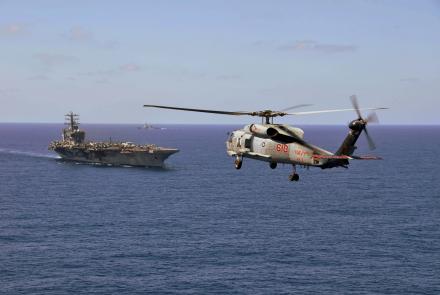
Image by #PACOM on flickr.
Troubled waters
The South China Sea is set to cause ripples on the global stage for many years to come, according to ANU Chancellor Professor the Hon Gareth Evans AC QC.
Speaking at the launch of a National Security College (NSC) Occasional Paper on the South China Sea disputes at Parliament House yesterday, Professor Evans called claims by regional states to territories within the South China Sea “probably the world’s single most complex and intractable international relations problem”.
“For foreign policy wonks, both practising and academic, the South China Sea is the gift that goes on giving,” Professor Evans said.
“It has multiple states making territorial claims of varying degrees of historical plausibility, competition for hydro-carbon and fisheries resources, controversies about freedom of navigation, and a history of potentially explosive physical confrontations over all of the above.”
The South China Sea and Australia’s Regional Security Environment is the fifth Occasional Paper from the National Security College and is a product of significant international collaboration involving scholars from across the region.
“The value of this publication I think lies primarily for a non-specialist audience, in the succinct way the opening papers describe the history and elements of the current inter-related disputes, and then successive papers (with very appropriately chosen authors in each case) spell out the issues from the perspectives of the most interested players: China, Vietnam, the Philippines, ASEAN, the US and Australia,” Professor Evans said.
The disputed claims are occurring in a sea through which over half the world’s merchant fleet tonnage and some 60 per cent of Australia’s trade passes annually, and which is vital for the energy security of Northeast Asia.
“I thought one of the most interesting contributions to the paper was that of Zhang Jian on China,” Professor Evans said. “Dr Zhang argues that China’s growing assertiveness in recent years in establishing a more visible presence in the areas it claims should not be seen as a prelude to raising physical-force stakes higher in the future, as many have feared.
“In fact, he argues, it can be seen as intended to create greater evidentiary support for claims that it intends to make in the future through legal and diplomatic channels.
“We’ll see…”
Professor Evans said that China needs to set aside once and for all the controversial U-shaped ‘nine-dashed line’, embracing roughly 80 per cent of the whole area of the South China Sea, which it has been using to define its interests in the area.
“If China is going to move down that path, it is going to have to be as a result of sustained and relentless international pressure, making clear over and again that nobody that matters in the international community takes seriously the nine-dashed line, and the ‘historic waters’ concept that seems to lie behind it, as having any credibility,” he said.
“I certainly believe that Australia should be firmly among the countries applying that pressure, by making such statements both privately and publicly.
“I hope this paper, and the book which will follow from it, will be widely read as a serious contribution to wider understanding of a very troubling regional and global problem.”
NSC is The Australian National University’s gateway for national security policy teaching and research and is based in the Crawford School of Public Policy, ANU College of Asia and the Pacific.
To download ‘The South China Sea and Australia’s Regional Security Environment’, as well as the full text of Professor Evans’ address, visit the NSC website.
Updated: 12 July 2024/Responsible Officer: Crawford Engagement/Page Contact: CAP Web Team













